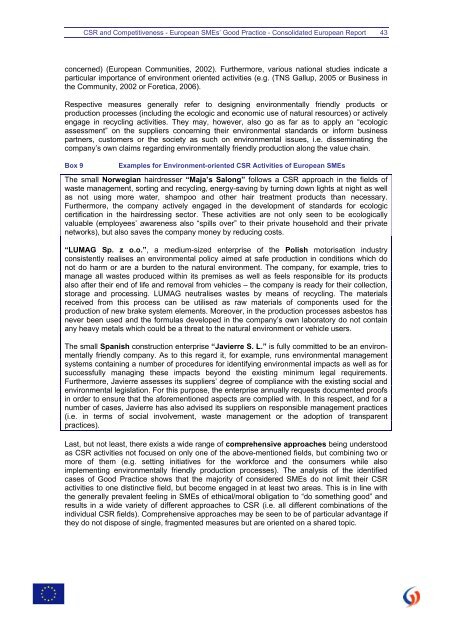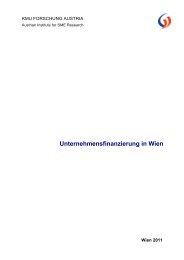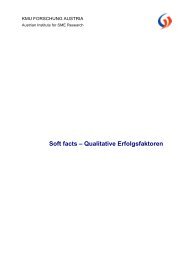CSR and Competitiveness European SMEs - KMU Forschung Austria
CSR and Competitiveness European SMEs - KMU Forschung Austria
CSR and Competitiveness European SMEs - KMU Forschung Austria
Create successful ePaper yourself
Turn your PDF publications into a flip-book with our unique Google optimized e-Paper software.
<strong>CSR</strong> <strong>and</strong> <strong>Competitiveness</strong> - <strong>European</strong> <strong>SMEs</strong>’ Good Practice - Consolidated <strong>European</strong> Report 43<br />
concerned) (<strong>European</strong> Communities, 2002). Furthermore, various national studies indicate a<br />
particular importance of environment oriented activities (e.g. (TNS Gallup, 2005 or Business in<br />
the Community, 2002 or Foretica, 2006).<br />
Respective measures generally refer to designing environmentally friendly products or<br />
production processes (including the ecologic <strong>and</strong> economic use of natural resources) or actively<br />
engage in recycling activities. They may, however, also go as far as to apply an “ecologic<br />
assessment” on the suppliers concerning their environmental st<strong>and</strong>ards or inform business<br />
partners, customers or the society as such on environmental issues, i.e. disseminating the<br />
company’s own claims regarding environmentally friendly production along the value chain.<br />
Box 9 Examples for Environment-oriented <strong>CSR</strong> Activities of <strong>European</strong> <strong>SMEs</strong><br />
The small Norwegian hairdresser “Maja’s Salong” follows a <strong>CSR</strong> approach in the fields of<br />
waste management, sorting <strong>and</strong> recycling, energy-saving by turning down lights at night as well<br />
as not using more water, shampoo <strong>and</strong> other hair treatment products than necessary.<br />
Furthermore, the company actively engaged in the development of st<strong>and</strong>ards for ecologic<br />
certification in the hairdressing sector. These activities are not only seen to be ecologically<br />
valuable (employees’ awareness also “spills over” to their private household <strong>and</strong> their private<br />
networks), but also saves the company money by reducing costs.<br />
“LUMAG Sp. z o.o.”, a medium-sized enterprise of the Polish motorisation industry<br />
consistently realises an environmental policy aimed at safe production in conditions which do<br />
not do harm or are a burden to the natural environment. The company, for example, tries to<br />
manage all wastes produced within its premises as well as feels responsible for its products<br />
also after their end of life <strong>and</strong> removal from vehicles – the company is ready for their collection,<br />
storage <strong>and</strong> processing. LUMAG neutralises wastes by means of recycling. The materials<br />
received from this process can be utilised as raw materials of components used for the<br />
production of new brake system elements. Moreover, in the production processes asbestos has<br />
never been used <strong>and</strong> the formulas developed in the company’s own laboratory do not contain<br />
any heavy metals which could be a threat to the natural environment or vehicle users.<br />
The small Spanish construction enterprise “Javierre S. L.” is fully committed to be an environmentally<br />
friendly company. As to this regard it, for example, runs environmental management<br />
systems containing a number of procedures for identifying environmental impacts as well as for<br />
successfully managing these impacts beyond the existing minimum legal requirements.<br />
Furthermore, Javierre assesses its suppliers’ degree of compliance with the existing social <strong>and</strong><br />
environmental legislation. For this purpose, the enterprise annually requests documented proofs<br />
in order to ensure that the aforementioned aspects are complied with. In this respect, <strong>and</strong> for a<br />
number of cases, Javierre has also advised its suppliers on responsible management practices<br />
(i.e. in terms of social involvement, waste management or the adoption of transparent<br />
practices).<br />
Last, but not least, there exists a wide range of comprehensive approaches being understood<br />
as <strong>CSR</strong> activities not focused on only one of the above-mentioned fields, but combining two or<br />
more of them (e.g. setting initiatives for the workforce <strong>and</strong> the consumers while also<br />
implementing environmentally friendly production processes). The analysis of the identified<br />
cases of Good Practice shows that the majority of considered <strong>SMEs</strong> do not limit their <strong>CSR</strong><br />
activities to one distinctive field, but become engaged in at least two areas. This is in line with<br />
the generally prevalent feeling in <strong>SMEs</strong> of ethical/moral obligation to “do something good” <strong>and</strong><br />
results in a wide variety of different approaches to <strong>CSR</strong> (i.e. all different combinations of the<br />
individual <strong>CSR</strong> fields). Comprehensive approaches may be seen to be of particular advantage if<br />
they do not dispose of single, fragmented measures but are oriented on a shared topic.




